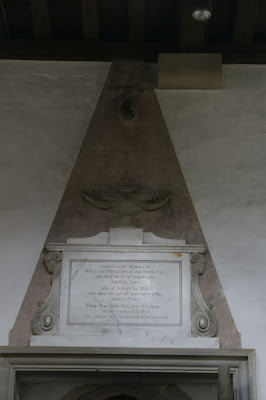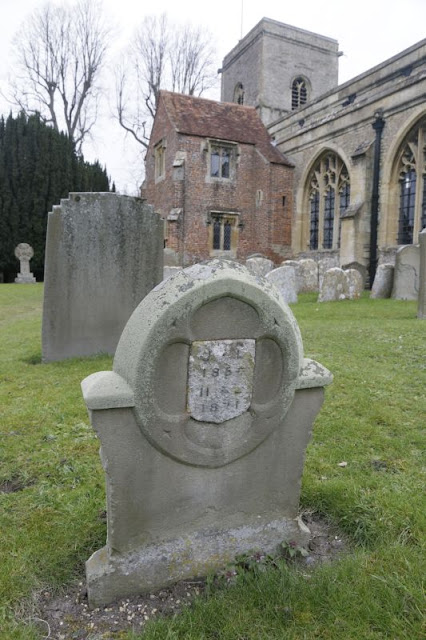I have visited the church before and on the occasion wrote a blog entitled Nineteen Eighty Four which may give a hint as to who is buried there. On that occasion I did not get to see the inside as there was a service going on plus I would not have been able to do it justice with out a tripod. Some information from Wikipedia
Sutton Courtenay Church, as it stands today, originated in the 12th century. The interior shows Norman zig-zag work and later carved capitals. On the tower door, there are crusader crosses inscribed by soldiers either hoping for or giving thanks for a safe return from the Crusades. The main south door is surrounded by a brick-built south porch built with money left to the poor of the parish by the 15th-century Bishop Thomas Bekynton of Bath & Wells. Over the porch is a parvise reached by a narrow stairway from inside the church. Other fittings include a 17th-century wineglass pulpit (installed in 1901), a carved mid-12th century font with fleur-de-lys pattern and three late 14th-century misericords. There is a close resemblance between the misericords at Sutton Courtenay and those created shortly afterwards at Soham, Cambridgeshire and Wingfield, Suffolk. It is possible that the same itinerant carver made all three sets. The church was nearly destroyed during the Civil War when munitions stored by the Parliamentarian vicar exploded in the church. You can read an indepth history on it's own Wiki page
No point in walking around the church again as you can see it all in the first link I left for 1984. But above is a view of the South side with the porch and on the left is the North Side

I did come across this what was most likely the chancel cross leaning on the wall. On the Left what looks like one of the original doorways

On the left is my favourite part the porch built with money left to the poor of the parish by the 15th-century Bishop Thomas Bekynton of Bath & Wells. I'm sure the poor were grateful. Can you imagine the outcry if some one did that now
The first place I did go was into the church and was rather knocked out by what I saw and really never know where to start when that happens as there is so much to see. The Nave looking down to the Chancel
Turning round and looking back to the font
Back again to view through the Chancel arch to the Chancel
Above in the chancel to the altar between the choir stalls and on the left is the altar with pouter cross and candle holders
The superb crucifix on the altar
Viewing from the side gives better view of the candle holders
Above the altar you see this superb Chancel Window
Not far away is this tomb effigy of a monk
and nearby what loos like an altar but cold be a tomb
The chandelier hangs in the chancel with candles in place
Here we look through the chancel past the choir stalls to the nave
The church does have it's fair share of memorials with the Roll of Honour from the second world war or Family memorials like the one on the right
This memorial attains to John Thomas Justice who lies in the catacombs of St Clements Hastings
While his Farther & Mother I presume are buried at this church

Another memorial to the Justice Family on the left though I found the memorial on the left unreadable
Most of you should know who George Orwell is

I never read the one here on the left so I presume I must have been stood by their grave.
Memorial to William Curtis on the right
The Dewe Memorial

The Body's of John & Sarah Heath lay buried near the memorial though I could not say if that was in the church or in the churchyard.
While you can see the Philips memorial over the entrance door
Also came across this memorial to Lord Wantage VC who is buried at Ardington

Couple of the vaults in the nave floor which are the largest ones you can see
The pulpit I must admit was tall, one of the tallest I've come across with it's (you will like this) abat-voix or Sounding board which is the bit above

Looking up you could see a dove in the centre and if you looked at the pulpit you can see it is what they call a "Wine Glass Pulpit" with the slender base
Anyway I was soon up there to get a view vicars through the centuries must have seen (mind you there would have been people in the pews) and I doubt has changed. It did worry me a bit in case the wine glass part broke on me though
I now show some of the other features round the church like the donations panel you see above.
At the back is a coat of arms with the ten commandments either side
I love this bequest giving money to six poor women every sabbath day, wonder if they still do?
This superb mural is under the coat of arms at the back of the church
and what I tough another bequest turned out to be a memorial
This mural behind an altar frames the church roll nicely

Not as many stained glass windows as I thought but they are pleasant enough to look at
Could not say how old the organ is but there is screened room beside it
Here we look from the nave to the North Aisle

The South Aisle is where you find the church roll and altar
The roof looks as impressive for it's age

On the left is the South Aisle while on the right we view the South Aisle looking towards the pulpit
We will leave the church with a look at the Font
heading down the churchyard to the part that is still in use
As you can see it is well kept and the grass cut
Walking back along the churchyard you will find George Orwell or Eric Arthur Blair as you will see on his headstone. Behind is David Astor his friend
Over one side I spotted this wooden head and foot memorial, on the right a view up the churchyard
The large tomb you come across is that of Herbert Henry Asquith who is buried here with his wife, he was the Prime Minister of the United Kingdom from 1908 to 1916.
The tomb on the left I though usual while the little angel on the right looks over the grave of the child below
Go round the front of the church and you find these headstones
On the South side you see these older headstones
Along with this tomb that looks very old as well
At one time I dare say this headstone looked more impressive than it does now
A couple more cast iron crosses used as memorials of a different time that I have seen
I will leave you with this view showing the daffodils growing beside the wall with All Saints in the background. If your round Sutton Courtneay then it is worth the time visiting the church.
Have a great Bank Holiday Weekend




























































7 comments:
Bill it is interesting to see several different style that have been added to the church over the years. The interiors is wonderful. Another nice job!
Another good extensive view and information on this church. I like to poke around the grave markers, too. You can see the church I posted by following the link at InSPIREd Sunday. Hope you a have a good long weekend! Here in the U.S. we have a long weekend, too. Monday is Memorial Day...
It's really beautiful inside although I thing the added on section that the poor paid for looks out of place with the different coloured bricks.
What a lovely set of images of this church... Images can tell one so much about a building.
Incredible! Although I do love graveyards, I was so impressed with the photos of the inside of the church. Very impressive. Glad to see the church is still in use today. Of what faith is this church? Anglican? And when do you suppose this church was built?
The mural of the 17th century beneactor was painted by Harry Wilder , a brilliant , kindly man who taught at Culham College.. I had the good fortune to live for a couple of years at the Manor House, thanks to the Hon. David Astor, in the 70s. I have wonderful memories of Sutton Courtenay and nearby places. Graham Lloyd (glloyd653@gmail.com)
First of my comments is to correct the name of the painter of the image of the benefactor, as noted by Graham Lloyd . William (Bill) Wilder was a family friend and his surviving son remains a friend of mine. My second comment is regarding the organ which I have had the privilege of maintaining from 1990 to 2018 (I have no idea whether it has been maintained since the latter date) Fuller details can be found on the National Pipe Organ Register ref N00015. It was built by Hardy and Son of Stockport in 1894 and stood at the east end of the north aislel. It was moved to the west end of the north aisle in 1970 by Arnold, Willilamson and Hyatt which firm made some alterations to the tonal schem among other things.
Post a Comment